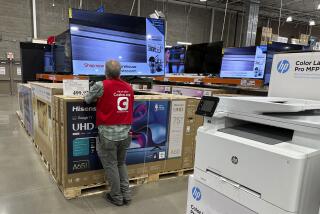BLS Concedes CPI Overstates Inflation
- Share via
WASHINGTON — The Labor Department’s Bureau of Labor Statistics conceded Friday that its key consumer price index overstates inflation, but by less than the 1.1 percentage point estimated by an independent panel.
In a formal response to the Boskin Commission study released in December, BLS researchers specifically dismissed about half of the 1.1 point estimate and said much of the other half could not be estimated.
“I have to caution you, there is a great deal of uncertainty about the other pieces,” said Kenneth Dalton, BLS associate commissioner for prices and living conditions.
Dalton and other BLS officials presented their response to the analysis of a panel led by Stanford University economist Michael Boskin at a hearing of the Joint Economic Commission of Congress. The BLS charged the Boskin commission with making numerous inaccurate inferences based on faulty or incomplete data.
“The BLS specifically rejects several of the estimated . . . biases, in cases where the commission presented new evidence,” the study’s authors said.
Dalton agreed that substitution bias--the failure to account for consumers switching among products when prices shift--artificially boosts the CPI by about 0.4% a year.
But the BLS report questioned several other Boskin conclusions, saying that the answers in many cases simply cannot be determined.
“There’s such a degree of uncertainty . . . we, as a statistical agency, cannot say,” Dalton said.
For example, the BLS cited huge uncertainties in gauging inflation in the mercurial health-care sector, which could cause extensive understatement or overstatement.
The BLS findings appear to affirm Congress’ decision not to mandate reduced inflation calculations in a resolution to balance the federal budget passed earlier this spring.
The CPI is used to determine annual increases in federal benefits such as Social Security and to adjust individual tax payments to account for inflation.
More to Read
Inside the business of entertainment
The Wide Shot brings you news, analysis and insights on everything from streaming wars to production — and what it all means for the future.
You may occasionally receive promotional content from the Los Angeles Times.










